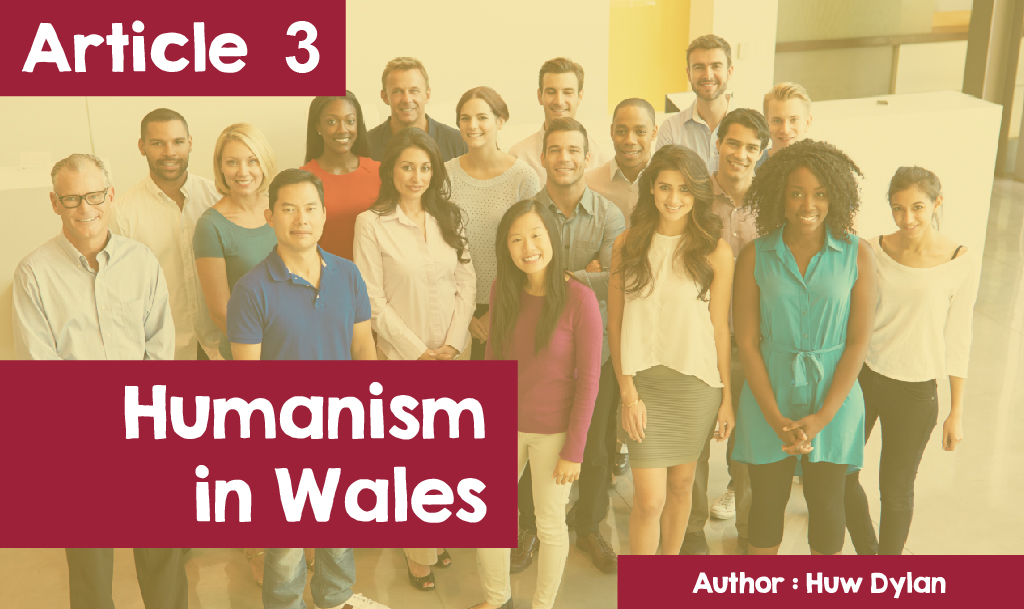Humanism in Wales
In recent years there has been an increase in the number of Humanist groups meeting in Wales and the number of people now calling themselves Humanists. Yet, if you were to ask people what Humanism is or exactly what Humanists believes, very few would be able to answer correctly. And that's why Humanists have been fighting really hard to get Humanism into the school curriculum.

© CC: BDHague (Pears' Cyclopaedia Final Edition 2017-2018)
So, what is Humanism? The Pears Encyclopaedia defines it this way - a person should show respect for another person, regardless of class, race or creed. That's fundamental to the humanist attitude to life. Fundamental moral principles important to the Humanist include freedom, justice, tolerance and happiness, and the attitude that people can lead an honest, meaningful life without formal religious belief.

© Mair Garland (Picture from Twitter)
In an interview with Cymru Fyw (BBC, 8 August 2020), Mair Garland, originally from Llantrisant but now living in London, defines Humanism in this way - "As a principle, it is not a religious movement, but neither is it anti-religious. Humanists believe in the power of people. I heard someone talking about humanist funerals, and someone asked, "If someone does not turn to faith when they are grieving, what are they turning to?", And the answer was "you turn to other people”. This is the main source of day-to-day comfort and advice. I respect people who have faith and are committed to that. Humanism fits with my principles - that science, logic and research are more important than religion - but I never had a name for it. It's nice to find another group of people who feel the same way.”

© humanists UK
According to the United Kingdom Humanist Association, generally Humanists believe - in the scientific way of understanding how the universe works and rejecting the idea of the supernatural. They make their ethical decisions based on reason, compassion, and concern for humans and animals. They believe that there is no life after death and no purpose to the universe and that human beings need to give meaning to their own lives by seeking happiness in this life and helping others to do the same.

In 2016, the Humanist Association of Wales was launched. The Society hopes to prevent schools from holding religious services, help families organise religious celebrations suitable for beginning and end of life, as well as weddings, and try to persuade people to accept the world and its things as we understand them today on the basis of scientific discoveries. There is a Humanist Group in Cardiff, that seeks to meet the need for personal contact with other Humanists within Cardiff and the surrounding areas of South-east Wales.
Established in 1966, the group aims to work against the prevailing religious belief that it is impossible to be a decent person without having religious beliefs; holding regular meetings giving Humanists the opportunity to meet locally to exchange ideas and discuss Humanist issues; acting as a local knowledge centre, for spreading Humanist ideas in the community and trying to establish Humanism as an attractive stance or perspective for living. Meetings are usually informal in nature and in the form of a presentation followed by a discussion on a topical issue. Guest speakers are invited occasionally. Similar groups meet in Bangor and West Wales.

© humanists UK
Following the rise of Humanism there is an increase in the number of people choosing to hold a non-religious ceremony - child naming, marriage and funeral. Anyone who leads Humanist services must qualify to do so. But what exactly is a humanist ceremony? What is a humanist naming service, and how is this different from baptism?

© Llun by Rachel Platt / humanism.org.uk
Mair Garland who is qualified to conduct such ceremonies explains - "Every ceremony looks different, depending on the family and child they are celebrating, but there are many elements that would be familiar to people. Parents can choose adults who support their child throughout their lives. We call them Guide parents, rather than Godparents. Parents and their friends can make promises to the children and think about what principles, interests and traditions they want to pass on. Instead of marking a cross on the head, you can do things like write messages to the child in a book, light a candle, or blowing bubbles is very popular. Usually, the administrator meets the family about twice, to get to know them first, and plans the ceremony accordingly, and makes it personal. If you're a fan of the Liverpool football team, why not sing ‘You'll Never Walk Alone?!’

There are all sorts of things you can do to celebrate. Of course, the ceremonies are not held in a chapel - they can take place anywhere; often in the child's home, or in a park. But in terms of including religious elements in the service, it's definitely something that can be discussed. I think of a song like Calon Lân, for example - people don't necessarily consider it a hymn, it's just part of our tradition. And if someone said that their old Auntie wanted to read something from the Bible, I might let them do it. But I do not lead prayer; for me, that's where the line is.”
Mair says "Demand for humanist funerals and weddings is also increasing. There is a very lively Welsh community in London, and I offer a Welsh or bilingual option for those families. There has always been a close connection between the Welsh language and Christianity, but today more people are realising that they do not have that faith, and that is a valid choice.”


